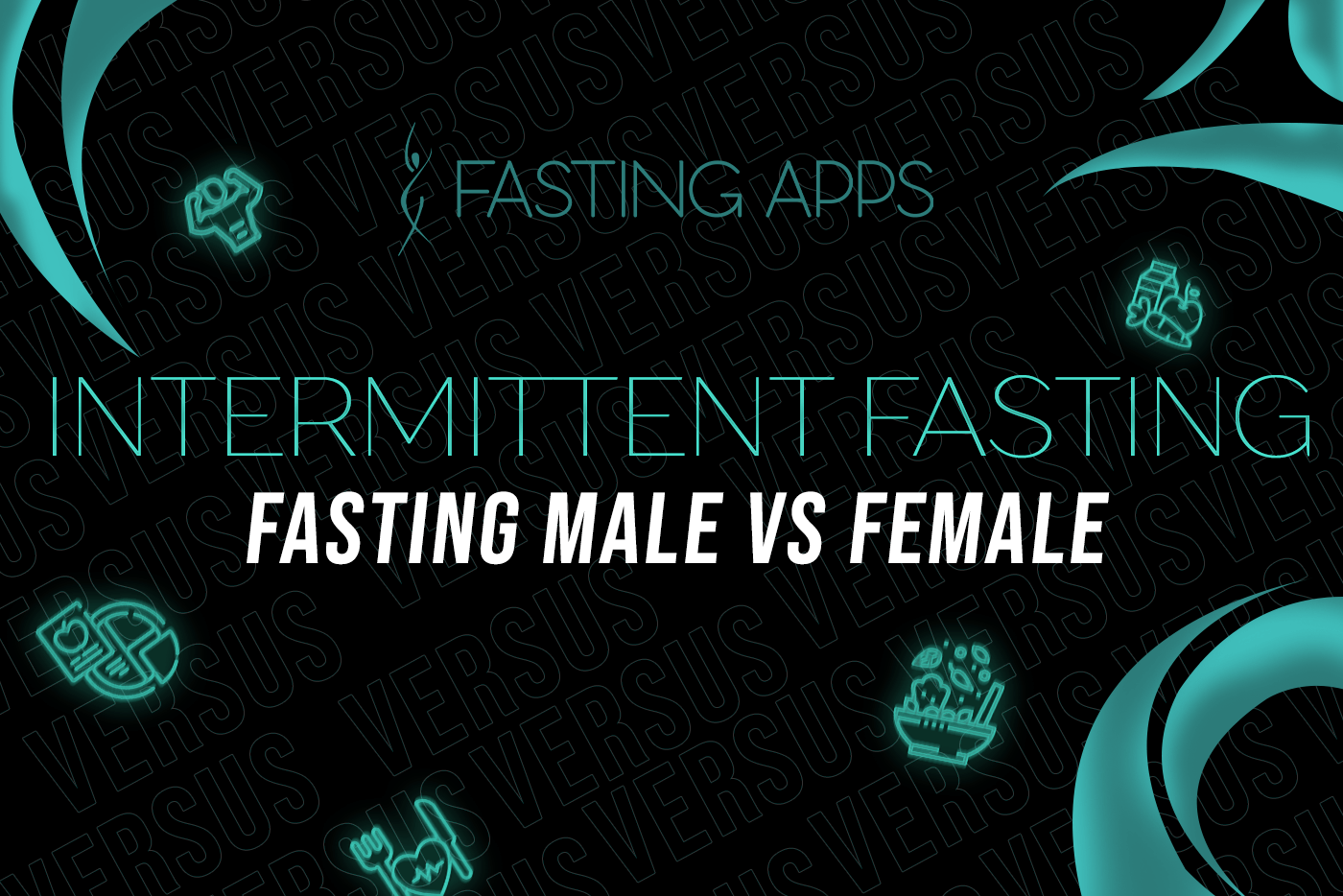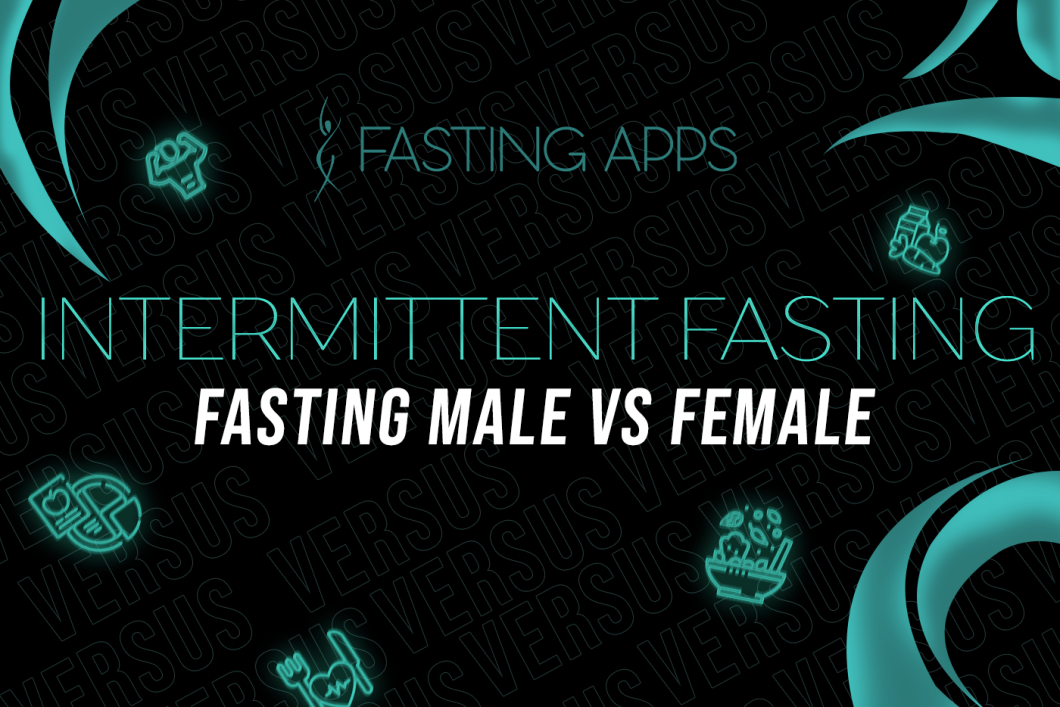Intermittent Fasting Male vs Female
Written by Andrew Brewer. ⚕️Reviewed and fact checked by our medical team.

Intermittent fasting is an effective weight loss plan that can completely overhaul your health and wellbeing, but everyone’s results are different. One person may lose more weight, while others drop more inches. Sometimes your progress will plateau as your metabolism has adjusted to your new eating schedule.
There are a number of different factors that can impact how intermittent fasting will affect you, and one of the most prominent is your gender. Results may vary by male or female intermittent fasters, so let’s explore some of the reasons why, including benefits, key differences, and how to choose.
Key Takeaways
Both men and women can benefit from intermittent fasting as a safe and effective weight loss plan.
Women may experience changes in their menstrual cycle and fertility due to intermittent fasting, while men may see an increase in testosterone levels.
Hunger may be more pronounced in women during intermittent fasting, but this can be managed with self-control and adjustment to the fasting routine.
The impact of intermittent fasting on triglyceride build-up and insulin response differs between men and women, and more research is needed to fully understand these differences.
Choosing an intermittent fasting plan that fits your lifestyle and goals is important for long-term success, and consulting with a doctor is recommended, especially if you are on medication.
Benefits of Intermittent Fasting for Women
Intermittent fasting in women can help you lose weight. Initial studies suggest that it may lower bad cholesterol more in premenopausal women than post-menopausal women, but more studies are needed to support this claim. Overall, there are no major differences in weight loss, glucose levels, HDL cholesterol, and triglycerides in women based on age, which is a great sign! No matter your age, you can reap all the benefits of intermittent fasting.
Pre-menopausal women may face changes in their menstrual cycle after intermittent fasting because fasting can impact their hormones. It may also impact your fertility, so consider your lifestyle before starting intermittent fasting.Benefits of Intermittent Fasting for Men
Intermittent fasting for men is an effective weight-loss tool. It’s also used to help lower your blood sugar, improve your heart health, and so much more. Intermittent fasting can also trigger an increase in Luteinizing Hormone, which is partially responsible for testosterone production. The higher your LH levels, the bigger boost you’ll get in your testosterone levels.
As you lose weight, you don’t have to worry about losing muscle. Intermittent fasting in men can help improve their insulin resistance and reduce the risk of developing diabetes and heart disease. Intermittent fasting in men can help you look and feel healthier.
What are the Differences?
Initial studies suggest that men and women lose a similar amount of weight when they are intermittent fasting. Still, there are differences that may make intermittent fasting a better choice.
Hunger
Studies show that women reported feeling hungrier during intermittent fasting than men. They were exposed to the same study conditions and stimuli, but women responded more to these elements. That’s not necessarily a bad thing. It just means that it may take a little getting used to and more self-control at first to get used to fasting.
Triglyceride build-up
During intermittent fasting, triglycerides will build up in your body, though, where is dependent on your gender. Studies show that they tend to build up in men’s livers and women’s muscles. At this point, the effect is unknown. More research is needed to see if there could be potential downsides to this triglyceride build-up.
Insulin Response
Intermittent fasting can have a huge impact on your insulin levels, but the jury is out just which sex benefits the most. A 2005 study suggested that the glucose response to eating was slightly impaired in women after fasting; however, their insulin response was unchanged. In this study, the male subjects faced a significant reduction in insulin response. Unfortunately, these results were flip-flopped in a study just two years later. Glucose levels in women were significantly lower after fasting.
It’s hard to tell who will get the better response, but both men and women will see insulin and glucose benefits during intermittent fasting.
How to Choose?
Intermittent fasting is safe and effective for both men and women, so if you’re considering starting a plan, first identify what plan will work best for your lifestyle. Consult with a doctor if you are on medication, particularly those that require you to eat while taking them, before starting intermittent fasting.
Our #1 Recommendation: DoFasting
It's easily one of the best intermittent fasting app that offers plenty of features for anyone!
Use coupon code: 10app to get an extra 10% off all memberships.
FAQ
What is the difference between intermittent fasting for males and females?
The difference between intermittent fasting for males and females lies in the fasting approach. Females may need to adjust their fasting schedule or caloric intake for hormonal differences.
Why might females need to adjust their fasting schedule or caloric intake?
Females may need to adjust their fasting schedule or caloric intake because their hormones, such as estrogen and progesterone, can affect their metabolism, hunger, and energy levels.
What common adjustments can females make to their fasting schedule or caloric intake?
Common adjustments that females can make include shortening the fasting period, reducing the frequency of fasting, or increasing calorie intake during eating periods.
Can females still benefit from intermittent fasting despite needing to make adjustments?
Yes, females can still benefit from intermittent fasting despite needing to make adjustments. However, listening to your body and adjusting as required is important to avoid negative effects.
What potential negative effects may females experience if they do not adjust their fasting schedule or caloric intake?
Females who do not make adjustments may experience negative effects such as disruptions in menstrual cycles, changes in hormone levels, and increased hunger.
Is it necessary for males to adjust their fasting schedule or caloric intake?
Males may also need to adjust their fasting schedule or caloric intake, depending on their needs and goals. However, hormonal differences may not have as significant an impact on males as on females.

